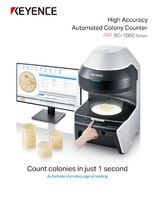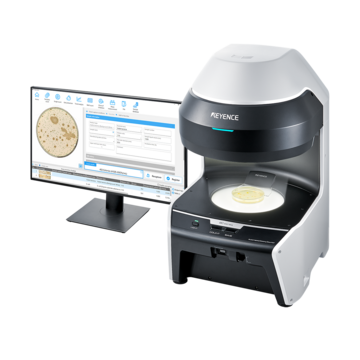In-House vs. Outsourcing Colony Counting
Should you outsource colony counting to an external service or consider moving towards in-house colony counting? This is a question a lot of laboratories must consider and weigh the pros and cons of each. This comparison page aims to help you make an informed desicion that aligns with your laboratory needs, budget, and long-term goals.
Exploring In-House Colony Counting
What is in-house colony counting? This means that all the work associated with sample preparation, colony counting, and analysis can be done on-site by the company responsible for the product. This usually requires there to be a dedicated laboratory space and trained personnel on-site.
Advantages of In-House Colony Counting
Let's review the main reasons that companies are switching to in-house colony counting!
- Control/flexibility:
- With the ability to do in-house colony counting, companies get complete control and flexibility over the evaluation process.
This allows laboratories to tailor procedures that meet their specific requirements and standards.
Testing for a new microorganism? Need to structure reporting to meet a standard? Need to meet procedure standards and regulations?
By having an in-house method for microbial testing, companies have the ability to quickly adjust processes to adapt to new business changes! - Turnaround time:
- Improve speed and efficiency with in-house colony counting, don't wait for external service providers to deliver results. As soon as your sample is ready, start the counting process! In fast-paced industries, the ability to obtain data in a timely manner is critical so companies can make better decisions faster.
- Cost efficiency:
- Over time, having an in-house colony counter can be more cost-effective, especially for laboratories with high volumes of samples. Once you’ve made the initial investment and have colony counting equipment, you can count any number of samples without incurring cost. When sending out to a 3rd party lab, you will need to pay per sample or test conducted, which can get quite expensive as test volume increases.
- Confidentiality:
- Another significant advantage is confidentiality. Keeping the evaluation process and results internal ensures that sensitive data remains within the laboratory, reducing the risk of data breaches or leaks. It's also much easier to ensure that the inspection process is compliant with internal data protection policies and regulatory requirements.
Drawbacks of In-House Colony Counting
Despite the many advantages of in-house colony counting operations, this may not be the best solution for every business.
- Initial investment and operating costs:
- If your company is considering handling microbial processes in-house, there are several costs to consider. There is the initial cost of setting up a proper laboratory space including utilities, safety measures, and infrastructure. The proper equipment will also need to be procured such as colony counters, incubators, autoclaves, and other necessary tools. Some ongoing costs for consumables will include petri dishes/plates, media, reagents, and sterilization supplies as well as maintenance, calibration, and repair costs.
With the BC-1000 Series Automated Colony Counter, companies get MORE than just a colony counter. The BC-1000 Series optimizes the entire workflow, from creating the check sheet, accurate counts at the click of a button, and even recording the data and images. This means reducing labor cost as anyone can now perform the count with virtually no experience. This means no more monthly 3rd party outsourcing costs. With the BC-1000 Series you can catch problems before they leave your building, preventing recalls and potential lawsuits. - Personnel and training:
- Dedicated personnel and resources are required which smaller laboratories might find challenging to staff without straining their workforce. Recruiting and retaining skilled technicians can pose challenges, including the requirement of ongoing training to ensure proficiency with equipment and protocols.
Eliminate the need for expert counters with the BC-1000 Series Automated Colony Counter. Avoid training new employees on the intricacies of distinguishing between colonies and residue and remove the subjectivity of counting overlapping small colonies with this easy-to-use system. Simply set your parameters once and capture accurate counts at the push of a button. - Quality control:
- Since the company will be testing samples in-house, the responsibility for ensuring the accuracy, precision, and reproducibility of testing results will fall directly on their shoulders. Processes will need to be created to ensure compliance with regulatory standards along with audit trails for tracking purposes.
The BC-1000 Series helps your lab count samples earlier, predict bacterial growth, and overall make the best decisions possible. Moreover, everything is imaged, documented, and recorded with CFR 21 Part 11 compliance. The BC-1000 Series will make audits a breeze!
Make quality control simple with the BC-1000 Series Automated Colony Counter! This system can generate reports automatically that ensure you are compliant with internal and external regulatory standards.
Curious about our pricing?
Click here to find out more.

Outsourcing Colony Counting
Instead of performing the lab work internally, outsourcing refers to sending out samples to testing facilities for analysis.
Advantages of Outsourcing Colony Counting
Outsourcing colony counting eliminates the need for large initial investments in equipment, facilities, and training, making it an attractive option for laboratories with budget constraints. As the need for more testing increases, additional samples can be easily offloaded to the testing facility without the need to expand operations internally. The ability to scale testing without investing in new equipment or personnel can be a major benefit. This is also helpful if your lab experiences any fluctuations in workloads, as you can easily scale up or down.
Working with an external lab can also give you access to their expertise and technology. These companies often stay up-to-date with the latest advancements and best practices, and many of them will also have state-of-the-art technology for accurately and rapidly testing customer samples. Their employees will also be experienced in colony counting and other microbial testing procedures to ensure you are getting accurate and reliable data. Lastly, by outsourcing colony counting, laboratories can free up their internal resources to focus on core research activities and other critical tasks.
Drawbacks of Outsourcing Colony Counting
While avoiding the need for any large initial investments, outsourcing your colony counting workload will incur an ongoing cost. Depending on the volume of samples that need to be tested, these costs can quickly add up. It’s important to try to plan and project these costs over time to determine where your breakeven point is relative to investing in an internal program.
You must also keep in mind that you are not the only customer for a testing facility, so your microbial tests may not be prioritized or handled in a timeframe that is needed for your business. This can be especially true for when large batches of samples need to be tested quickly. You also need to account for the time it takes to ship your samples and the potential for delays or losses. If your business requires or could require results to be obtained immediately, then having the resources to do testing in-house could be vital.
Outsourcing also means relinquishing control over the counting process, requiring laboratories to rely on the external provider’s methods and standards, which might not always align perfectly with your own. Furthermore, sharing samples and data with an external provider introduces potential risks related to confidentiality and data security, making it essential to vet providers thoroughly and ensure they comply with relevant data protection regulations.
We’re here to provide you with more details.
Reach out today!

Conclusion
The decision between in-house colony counting and outsourcing hinges on several factors, including budget, sample volume, need for control, and resource availability. In-house colony counting offers greater control and potentially faster results but requires significant upfront investment and resource allocation. Outsourcing provides flexibility, access to expertise, and reduced capital expenditure but may involve longer turnaround times and recurring costs. By carefully considering these factors, laboratories can choose the option that best fits their operational needs and strategic goals, ensuring optimal efficiency and accuracy in their microbial colony counting processes.
Whether you currently have a lab capable of managing microbial testing or are considering bringing colony counting in-house, the BC-1000 Series Automated Colony Counter is a cost-effective solution for any program. This system can quickly count any number of colonies in just one second, allowing you to handle any level of workload without the need for large equipment investments or added personnel. Its integrated software provides users with audit trails, documentation, and customizable reporting so you can get results that are formatted to work with your organization’s requirements. The BC-1000 Series is also incredibly easy to use, allowing for anyone to operate it and obtain accurate colony counts with minimal training.
For more information, download the product catalog or request an onsite demo!
Contact us to learn more about how our advanced technology can help take your business to the next level.
Contact Us



